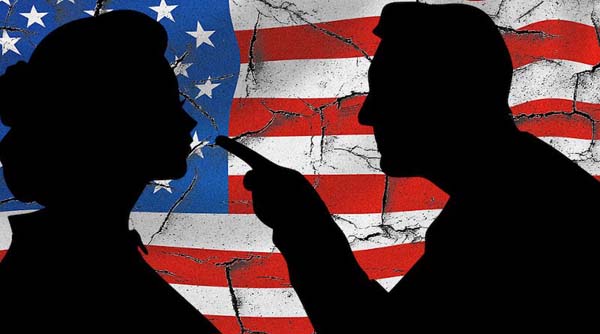
Moderate Americans are tired of the political shouting
Kerry Boyd Anderson
Americans’ deeply polarized politics are increasingly touching every facet of daily life, leaving many people feeling exhausted and judged. Americans who identify with a strong right-wing or left-wing group at least can retreat into their political tribe, where they know they will find approval for their beliefs and actions. However, moderates feel increasingly stuck in the middle.
Political moderates in the US have fewer support structures than in the past. The polarization of national media and the decline of local news have left only a few media outlets that do not promote a specific political narrative. Social media algorithms reward the types of controversial postings that elicit lots of clicks and comments. Religious institutions are increasingly pulled apart by activists on the right and left of the political spectrum, eroding one of the key spaces where Americans of different political persuasions used to develop relationships and share rituals.

Polarization predates Donald Trump’s presidency, but his term in office accelerated the trend of politics seeping into every aspect of life. The politicization of public health measures during the pandemic led to heated disputes about vaccines, social distancing, school closures and masks that have divided communities and families. Public schools have long played an essential role in creating shared experiences within a community, but polarization has turned many public schools into political battlegrounds. In some places, parents, children and teachers are facing protesters and social media campaigns that invade children’s privacy and disrupt schooling, with people arguing over issues like wearing masks in schools and whether and how to teach about the country’s history with race.
Trump thrived on division and controversy. President Joe Biden promised to calm the rhetoric, winning many moderate voters with that pitch. While Biden has tried to lower the political temperature, he has been unable to roll back the polarization. Shortly before his inauguration, the 2021 attack on the US Capitol further complicated efforts to bridge political divides.
While Americans who identify strongly with positions on the right or left of the political spectrum yell at each other on social media or in protests, school board meetings and homes, many more moderate Americans feel squeezed. They feel that their voices are being drowned out by the screaming on both sides. Of course, those on the right and left of the spectrum feel that they have every right and reason to fight for their views. Most moderates would agree, but wish that their fellow citizens would at least try to listen more and insult less.
One challenge for Americans in the middle is a lack of clarity about defining “moderate.” The terms “moderate,” “independent” and “undecided voter” do not always describe the same people, as Lee Drutman noted in a 2019 article for FiveThirtyEight. While 37 percent of Americans self-identify as moderate, according to a recent Gallup poll, people’s perception of what it means to be moderate depends a lot on the people around them. For example, a person living in a deeply Republican community and a person living in a deeply Democratic community might both see themselves as moderate relative to their community but, in comparison to each other, they would have vastly different views.
While acknowledging the difficulties of defining moderates, it is still possible to identify them as important voters in US politics. Many Americans do not believe in a particular political ideology or identify strongly with a political tribe. Furthermore, many Americans are effectively pragmatic centrists. They do not want to engage in culture wars. They tend to value government competency and want quality education in schools, reliable infrastructure, safety and a functioning economy. They tend to have nuanced perspectives that do not fit neatly into a political box; for example, they might reject far-right views that want to ban all abortions and also reject far-left views that advocate no restrictions on abortion. Similarly, they tend to reject ideological views on immigration, economic policy, gun rights, education and more. American moderates do not fit into groups that are easy to poll or target in political campaigns, but that does not mean they do not exist or matter.
As a percentage of the population, moderates have somewhat declined in the last 20 years, according to Gallup. However, various measurements suggest that moderates today still comprise between a third and half of Americans. They are divided among the Republican and Democratic parties and independents, although the Democratic Party has more moderates than the Republican Party, according to polls.
US moderates do not fit into groups that are easy to poll or target in political campaigns, but that does not mean they do not exist or matter.
In the 2018 midterm congressional elections, moderate candidates and voters played an essential role in the Democrats regaining a majority in the House of Representatives. Their role in the November 2022 midterm elections is unclear, however. For several reasons, the environment is more favorable to Republicans. Republican leaders know they need to appeal to independent and moderate voters, but they must also engage their base, which embraces right-wing views.
Meanwhile, many moderate Americans feel alienated from politics and unrepresented by either party at national, state and local levels. Moderates struggle to form any movement that might highlight their voices because their group is so diverse, with no single issue or ideology around which to coalesce. Americans on the right and left of the political spectrum tend to be the most politically engaged, playing an outsized role in determining a party’s candidates and policy positions. This leaves moderates at a disadvantage. Many are tempted to opt out of politics, but doing so would only further silence their voices. Moderate Americans’ best hope is to increase engagement in politics and try to insist on more civil and nuanced dialogue.
The writer is a political risk consultant with more than 18 years of experience as a professional analyst of international security issues and Middle East political and business risk.
